'Pursuing' responsibility of functional sectors on pressing public issues
(Baonghean) - The content of the questioning at the 3rd session of the Provincial People's Council focused on 3 areas that the public is very interested in, which are: Inadequacies in planning and licensing the construction of apartment buildings in the province; Inadequacies in the new VNEN school model and socialization in schools; Social insurance arrears and health insurance overspending.
» Questioning in the hall: Frank and to the point
» Must balance health insurance fund while ensuring patient rights
» Voters are not satisfied with the questioning session on the VNEN model
Authorities "avoid" difficult questions about construction management and licensing
As the first person to answer questions at the 3rd session of the Provincial People's Council on the issue of planning and management of high-rise apartment building construction, Mr. Hoang Trong Kim - Director of the Department of Construction said: The shortcomings in planning and construction are mainly due to the limited capacity of some investors and their lack of understanding of the law on investment and construction. In addition, the local authorities at the district and commune levels have not strictly handled the cases according to the provisions of the law; the organization of inspection, detection and handling of violations has not been timely; the inspection and examination work of specialized state management agencies has not been carried out regularly and continuously.
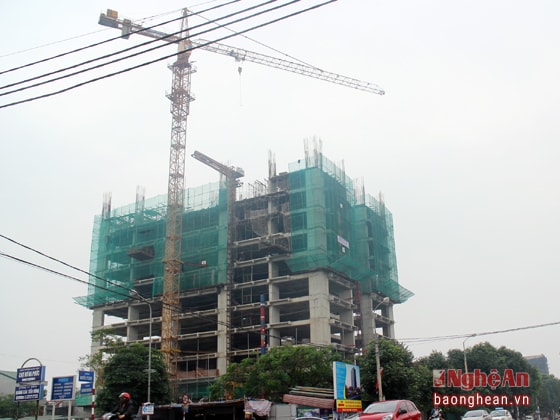 |
| 17 cranes were suspended. |
After the head of the Department of Construction stated the responsibilities of the various levels in state management of the above mentioned field according to decentralization, many opinions were sent to the representative of the Department of Construction. Delegate Dang Quang Hong (Nghi Loc district) questioned the solution for 8 unlicensed apartment buildings.
Delegate Thai Thi An Chung (Tan Ky) stated: Regarding the existence of high-rise apartment buildings, the Department of Construction has specifically stated the responsibilities of the parties. However, in the report, the responsibility of the Department of Construction is not satisfactory and needs to be clarified. Currently, there are many tower cranes appearing in Vinh city. Are there any management regulations?
Delegate Tran Duy Ngoan wondered why the project was built without a license, with or without "backing", is it a manifestation of defiance of the law?
Delegate Nguyen Van Lu raised the question: Can the Department of Construction delegate authority to Vinh City to issue permits and manage construction in the city? If so, Vinh City will take responsibility before the province and the department for ensuring the issue of issuing construction permits and managing construction in the area.
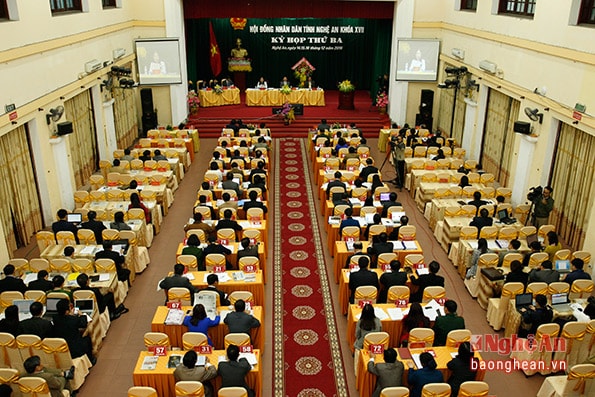 |
| Overview of the third session, 17th Provincial People's Council. |
Responding to questions, Director of the Department of Construction Hoang Trong Kim explained: For 8 unlicensed apartment buildings, according to the provisions of the Construction Law, there are 4 forms of handling, or suspension of construction; if the violation is serious, the construction will be forced to be dismantled, administrative violations will be handled (possibly criminal proceedings). For example, Muong Thanh Cua Dong Hotel has handled the construction outside the licensed land, requiring demolition. Bao Son commercial center project caused cracks in people's houses, the department has coordinated with Vinh City to handle the investor who has agreed to compensate. Regarding the management of tower cranes, there are State regulations including standards on technical safety, labor safety with technical parameters of equipment. Responsibility for unsafe use belongs to the investor and related contractors.
Regarding the question of delegate Tran Duy Ngoan, according to Mr. Kim, there is currently no good coordination between agencies to check whether the project is licensed or not, in which the grassroots level is important according to decentralization, the Department of Construction cannot go to the grassroots to check on its own. As for whether or not there is support for illegal construction projects, there is currently no evidence to mention...
With the opinion of delegate Nguyen Van Lu, Mr. Kim agreed with the possibility of decentralization to the city in licensing and managing construction projects, however, the Department of Construction needs to consider carefully, if it is in accordance with the law and the local government has enough capacity, the department will propose reasonable decentralization.
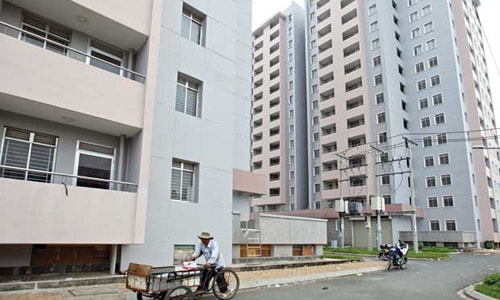 |
| Businesses say that cumbersome construction and project investment licensing procedures have pushed up costs and housing prices. |
According to the assessment of the session chairman, the Department of Construction's response to questions was complete but there were still many unclear issues. Vice Chairman of the Provincial People's Council Hoang Viet Duong said that planning and construction order management were not strict; the decentralization of handling violations between levels and sectors was not clear. In high-rise apartment buildings, there were still many problems related to labor safety, environmental pollution... that needed to be overcome. At the same time, he requested the Provincial People's Committee to give strong direction on planning and construction management, ensuring compliance with the provisions of the law.
Attending the question and answer session, Chairman of the Provincial People's Committee Nguyen Xuan Duong accepted the opinions of the meeting, affirming that he will direct the Department of Construction and authorities at all levels to strictly implement legal regulations to do well in planning and construction management...
It can be seen that in this content, the representative of the Department of Construction, although having fully answered the questions, still "avoided" and did not answer the key points of some "difficult" questions.
Proposal to temporarily stop replicating new school models (VNEN)
Ms. Nguyen Thi Kim Chi - Director of the Department of Education and Training was the second person to answer questions about applying the VNEN model and socializing education.
Before answering questions, Ms. Nguyen Thi Kim Chi presented a report explaining two areas: results of implementing the new VNEN school model and promoting socialization in schools.
Regarding the reasons for the implementation of the new VNEN school model as expected, Ms. Nguyen Thi Kim Chi stated that it was mainly due to the crowd mentality and the candidate mentality of parents and people. Communication work was not effective. The head of the Department of Education and Training also said that it is necessary to learn from experience in organizing and disseminating policies; training and fostering staff; guiding, inspecting, urging; and communicating to create social consensus.
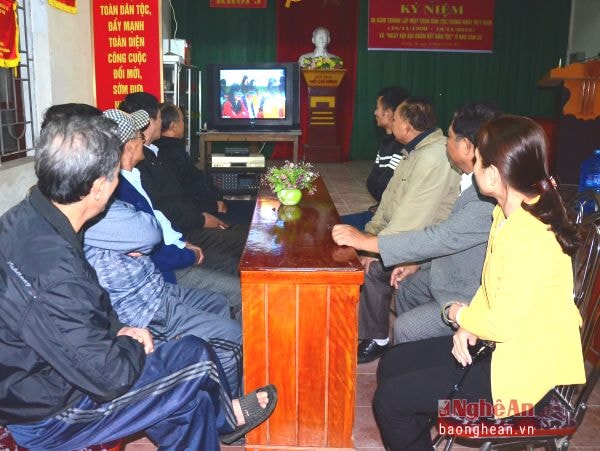 |
| Voters of Block 5, Truong Thi Ward (Vinh City) watched the question and answer session on live TV. Photo: Thanh Le |
Regarding the socialization of education, Ms. Nguyen Thi Kim Chi affirmed that the process of managing and using funding sources thoroughly follows the principles: Voluntary, for the right purpose; democratic, public, transparent. However, there are still some shortcomings and limitations such as overcharging.
Seven delegates participated in the question-and-answer session, with dozens of questions being asked for the Director of the Department of Education and Training to answer. The content revolved around the shortcomings in implementing the new VNEN school model and the direction of implementation in the coming time.
Questions from delegates Dinh Thi An Phong (Nghi Loc), Nguyen Thi Lan (Do Luong), Nguyen Huu Cau (Director of the Provincial Police), Nguyen Nhu Khoi (Director of the Provincial Radio and Television Station) stated: Teaching according to the VNEN model requires many conditions, while in reality there are still too many shortcomings, not meeting the requirements in terms of facilities, teachers, learning materials, too many students, parents do not agree... so voters think that the reality of the province is not suitable to implement this teaching model. In the coming time, should the industry advise and decide to teach according to this new model? During the pilot phase, there is financial support, but after stopping without support, how will it be implemented?
Delegate Luc Thi Lien - Quy Chau unit requested the Department of Education and Training to inform whether the application of this model in mountainous areas is appropriate or not? Are there any solutions to support schools and teachers in mountainous areas? Is there still a situation in schools that provide extra tutoring in the afternoon for students due to concerns that students do not grasp the lessons in class? Delegate Nguyen Thi Lan (Do Luong) also frankly questioned: The Director of the Department of Education and Training assessed that the VNEN model is implemented synchronously, but through actual surveys, it shows that it is not synchronous, for example, in some schools, textbooks are not complete; parents in some schools do not understand the process?
 |
| VNEN class at Mon Son 2 Primary School, Con Cuong. |
Regarding the content of socialization, delegates raised the question: Regarding extra teaching, extra learning, and overcharging, as a leader of the industry, Ms. Nguyen Thi Kim Chi has advised the province to conduct inspections and audits of how many units and individuals and how many have been handled? Currently, there are still many violations in the implementation of school fees, could you please tell us the causes and solutions?
Responding to questions from delegates, Ms. Nguyen Thi Kim Chi said: The issues mentioned by delegates are also concerns of the industry, but before the task of educational innovation, the industry cannot but carry out the task. In principle, the VNEN model is good, the important thing is whether the implementation is appropriate or not.
Regarding the difficulties, with the large number of students (mainly in schools in Vinh City), Ms. Nguyen Thi Kim Chi explained: Is it possible that a city unit does not implement educational innovation, so the department has "reluctantly" chosen to allow schools in the area to implement (?) Regarding the quality of the teaching staff serving the implementation of the new teaching model, the Director of the Department of Education and Training said: All meet the training standards, however, teaching according to this model requires teachers to be dedicated and responsible, so the department has directed the school to select good teachers to arrange to teach classes applying the new model.
Regarding the quality of students, some study well, some do not study well according to the VNEN application. The Director of the Department of Education and Training said that this is a normal phenomenon, any learning model will have similar manifestations. Regarding teacher training, Ms. Kim Chi affirmed: The Department has done a very full job every year; the Department will continue to strengthen training and promote the spirit of self-improvement. The Director of the Department of Education and Training also said: Implementing VNEN in mountainous areas is quite good in training students' ability to integrate into the community. Tutoring for students only happens in a few places, especially Vinh City; mainly because parents are too concerned about their children, wondering about the effectiveness and implementation roadmap as well as how the exams will be. The Department will review and make adjustments to this issue. Regarding exams, the Department will follow the instructions of the Ministry of Education and Training...
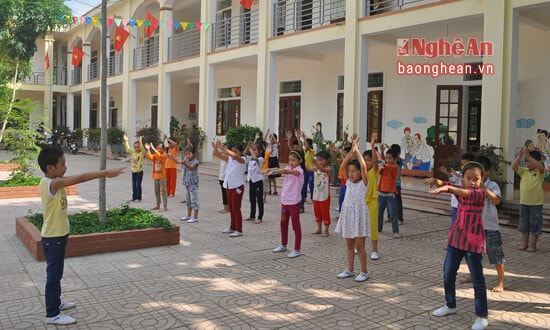 |
| Physical education hour for students in Quang Tien ward, Thai Hoa town. |
Regarding overcharging in schools, Ms. Nguyen Thi Kim Chi accepted and promised to promptly rectify. Regarding overcharging and extra teaching, Ms. Kim Chi said: The Department attaches great importance to inspection work, and every September there is a specialized inspection plan. However, it is impossible to inspect everything. In 2016, 9 districts were inspected and official dispatches were sent to the districts requesting handling of primary and preschool schools that violated the law. In the coming time, with the positive results that have been seen and the shortcomings that the industry has implemented, the Director of the Department of Education and Training said that he has directed and encouraged schools to apply the law voluntarily.
Concluding the questioning session on educational issues, Mr. Nguyen Xuan Son - Chairman of the Provincial People's Council said: In order for education to develop to meet new requirements, there are still two very troubling issues, which are how to continue to fundamentally and comprehensively innovate education; how to invest in improving the quality of teaching and learning? Through questioning the two contents of the Education and Training sector at the meeting, it was shown that the actual implementation still has too many shortcomings. From there, the meeting chairman proposed that the Provincial People's Committee temporarily stop replicating the VNEN model in the province, and only implement the new school model on the basis of ensuring the principle of voluntariness, the school must ensure that it fully meets the implementation conditions. For schools that have implemented it, all levels and sectors need to objectively evaluate, draw out good elements to promote, and minimize the shortcomings.
Regarding the socialization of education, what voters are concerned about is mobilizing parents; although socialization has contributed a lot to the construction of school facilities, at the beginning of each school year, parents are concerned about over-collection and improper use. Therefore, the Chairman of the Provincial People's Council proposed to review the guidance on implementing socialized revenue and expenditure, whether it is complete and scientific or not? The mobilization of contributions must ensure the principle of voluntariness, not imposition, and must strictly follow the 4-step process. It is recommended to strengthen the inspection and supervision of socialized contributions and identify this as the work of many levels and sectors. The Provincial People's Committee and the Department of Education and Training continue to direct to meet voters' wishes on these two contents.
Social insurance does not shirk responsibility in the problem of health insurance overspending.
Also in the question and answer session, on the afternoon of December 15, many delegates raised questions to the authorities about the health insurance fund deficit and social insurance arrears. Responding to questions sent by voters before the session, Mr. Le Truong Giang - Director of Nghe An Provincial Social Insurance reported on the issues of health insurance fund deficit and social insurance arrears.
Accordingly, although Nghe An had a deficit in the health insurance fund in 2016, the total health insurance expenditure for the first 9 months of the year and the entire year of 2016 is still within the assigned budget and within the ability to regulate and balance the health insurance fund of Vietnam Social Security...
Entering the questioning session, delegates Dinh Thi An Phong (Nghi Loc), Nguyen Van Hai (Tuong Duong), Lo Thi Kim Ngan (Que Phong), Luc Thi Lien (Quy Chau) focused on questioning the content of the Health Insurance Fund deficit, with the following questions: What is the responsibility of the provincial Social Insurance agency when allowing the Health Insurance Fund to have a deficit? Clarify the responsibility of the Health Insurance appraisal department - is there any collusion between this team and medical examination and treatment facilities? What are the measures of the provincial Health Insurance to ensure no deficit while ensuring the people's health insurance benefits? Does the provincial Social Insurance need to publicize the health insurance units that have large deficits in the Health Insurance Fund?
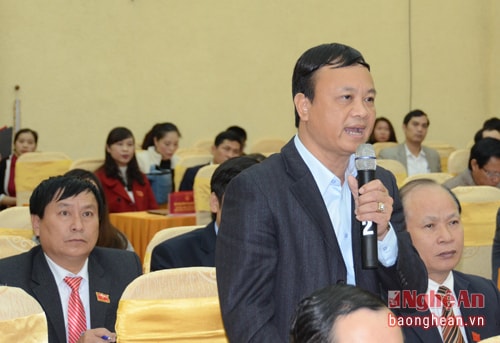 |
| Delegate Nguyen Van Hai questioned issues of health insurance management software and the rights of social insurance payers. |
Responding to questions from delegates, Mr. Le Truong Giang said: The deficit of the health insurance fund in 2016 was predicted due to policy changes, but also because the health insurance agency has not yet implemented timely inspections and checks, and is still confused. This is a subjective error, the social insurance agency does not shirk this responsibility. Currently, the industry has not discovered any appraisers who cover up or collude with medical examination and treatment facilities. The provincial social insurance agency has issued an official dispatch to strengthen the management of this team. When detecting negative actions of appraisers, they will be strictly handled, forced to resign, and transferred to the investigation agency.
Payment from medical examination and treatment facilities is based on the service fee mechanism, which means that the more technical and service indications, the more beneficial the medical examination and treatment facility is. The provincial Social Insurance resolutely refuses to pay for unreasonable indications. Recently, the provincial Health Insurance has noticed that: Medical examination and treatment facilities in Vinh city and surrounding areas have large overspending, medical examination and treatment facilities in mountainous areas have small overspending or even surplus. To prevent overspending and ensure the rights of patients, in the coming time, the provincial Social Insurance will focus on advising the Provincial Party Committee and the Provincial People's Committee to develop subjects towards universal health insurance; coordinate with functional agencies to inspect the use of health insurance funds at medical examination and treatment facilities, forecast developments in health insurance examination and treatment work to proactively deploy control solutions; strengthen appraisal work at facilities with abnormally increased costs to detect early abuse and profiteering...
To clarify the issue of health insurance fund deficit, the chairman of the question and answer session invited the representative of the Department of Health to explain the related content. Mr. Hoang Van Hao - Deputy Director in charge of the Department of Health said: Comparing the medical examination data in 2016 and 2015, the number of medical examinations did not increase. However, the number of people going to medical examination and treatment at district-level medical facilities increased significantly, while the number at commune-level medical facilities decreased sharply. People used services and techniques with higher unit prices. The reason for the increase is that in the past year, Nghe An has applied and mastered 175 new medical examination and treatment techniques.
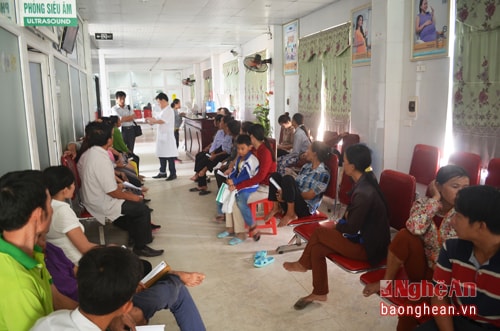 |
| People waiting to do medical examination procedures at Quang Khoi General Clinic (Hoang Mai) Illustrative photo |
In addition to the above objective reasons, the representative of the Department of Health added: The subjective reason is that some units and individuals have not properly implemented the State's policies on health insurance, and have abused technical services and drugs. Meanwhile, the work of inspection, examination and appraisal has not met the requirements. The solution to prevent the overspending situation of the health sector is: Enhance the responsibility of the heads of health care units, strictly handle violations; Thoroughly apply information technology in health care management and health insurance payment, eliminate the situation of going to one place in the morning and another in the afternoon; Research and apply the family doctor clinic model.
Concluding the questioning session on the issues of health insurance fund deficit and social insurance arrears, Vice Chairwoman of the Provincial People's Council Cao Thi Hien requested the health sector and social insurance to strengthen coordination in controlling the fund from the beginning of the year and strictly inspect and handle violations. Regarding social insurance arrears, the provincial social insurance agency needs to improve its responsibility in debt collection, proactively approach businesses, ensure the legitimate rights of workers; coordinate well with the Provincial Labor Federation to sue businesses in court.
PVTS Group

